Revisiting Linux Part 1: A Look at Ubuntu 8.04
by Ryan Smith on August 26, 2009 12:00 AM EST- Posted in
- Linux
CPU Benchmarks
We’ll start our short look at Ubuntu’s performance with our CPU intensive benchmarks. Up first is SuperPi, a single-threaded pi-calculating benchmark. Here we time how long it takes to calculate Pi to 1 million digits.
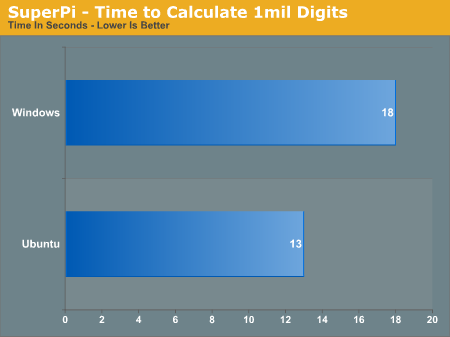
We ran this test several times more than usual just to make sure we weren’t seeing any kind of error. The Linux version of SuperPi really is about 30% faster than the Vista version. Keep this in mind, this will be an important point later.
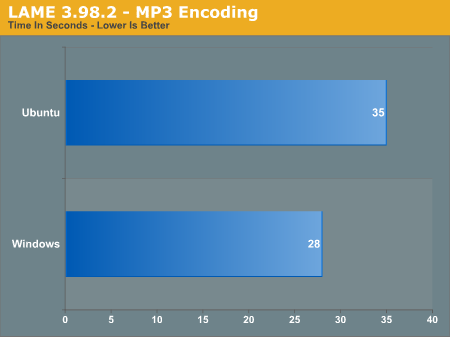
Meanwhile the situation for LAME is inverted. Vista outscores the Linux version by nearly 20%.
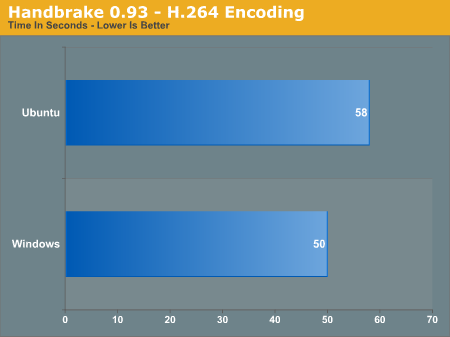
Using the cross-platform X264-based Handbreak for our video encoding test, Vista once again pulls ahead of Linux.
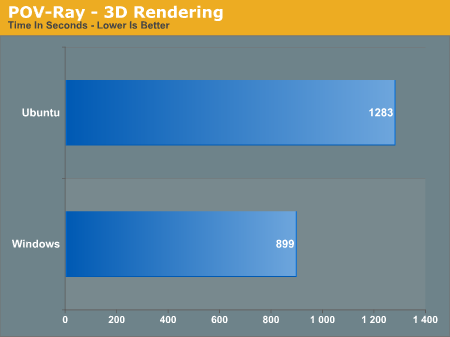
Once more Vista is ahead by a large margin.
From what we can tell, there’s little-if-any innate performance advantage to Vista or Linux in these benchmarks. Our working theory is that the performance difference comes down to the compiler used. Many Linux applications are compiled with GCC, while for Windows it’s either the Visual Studio compiler, or Intel’s own compiler (which is also available for Linux). There’s also a matter of compiler settings, as we saw in our quick breakout of Firefox benchmarks.
Meanwhile SuperPi uses a lot of hand-rolled code, although we’re still not sure why it’s outperforming Vista on Linux by as much as it is.
To shed a little more light on this idea of compiler performance, we have a few benchmarks of Windows application performance under Ubuntu through Wine.
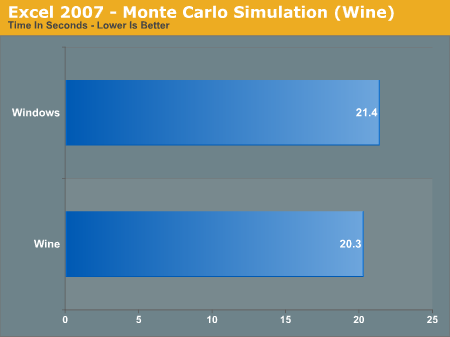
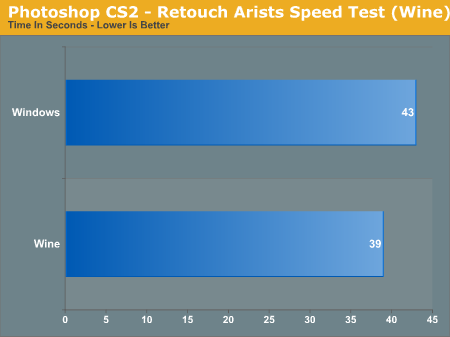
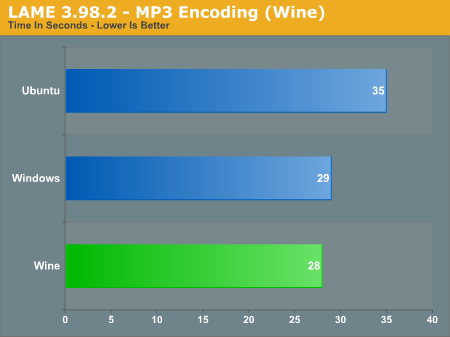
Here we see a most amazing thing: Ubuntu is outperforming Windows at running Windows applications! As we’ve removed the influence of compilers the Photoshop results are particularly interesting. From what we can tell it’s normally as fast under Linux as it is Vista, however there seems to be a short gap of low-CPU usage when running it under Vista that doesn’t occur when running it under Ubuntu. As a result Ubuntu finishes a few seconds earlier.
There are a number of conditional cases that mean that applications running under Wine don’t always match or beat Windows performance, but in our tests there’s no performance hit to using Wine to run Windows applications.
These results also lend a great deal of support to the idea that there’s a significant difference in performance between the two operating systems due to their compilers. This goes particularly for the LAME benchmark, where the performance gap melts away under Wine. This is something we’re going to have to look in to in the future.










195 Comments
View All Comments
justniz - Wednesday, August 26, 2009 - link
Maybe I'm missung something but this appears to be a new article.Why are you reviewing a year-old version of Ubuntu? there's been nearly 3 releases since that (Ubuntu is on 9.04 now with 9.10 coming very soon).
Its important to review the most recent version as Ubuntu is totally unlike the Microsoft world in tnat new releases are frequent (Every 6 months) and have real practical improvements.
ioannis - Wednesday, August 26, 2009 - link
I couldn't help myself, but...RTFA!!
:-D
PS: if you read the article, you will also get the joke ;)
nafhan - Wednesday, August 26, 2009 - link
Great article. I look forward to reading the follow up.One comment on security that I would like to make. The commercial Linux vendors (IBM, Novell, Redhat, etc.) are all VERY dedicated to ensuring Linux security, as many/all of their server products use Linux, and changes they make will filter back down to the Linux desktop community. This is something that OSX does not have to nearly the same degree.
My experience with running Linux on the desktop sounds pretty much the same as yours.
-Games killed it in general. I don't usually have a top of the line system. So, I'm usually pushing my computer its limits to run newer games under Windows. Also, I hate dual booting, and most of the FOSS I use is available as a compiled binary for Windows.
-Drivers killed it in one specific instance with an older laptop, as I never got NdisWrapper (required for my wifi cards Windows drivers) to run better than intermittently. I spent way to much time messing with it.
crimson117 - Wednesday, August 26, 2009 - link
[quote]and for the price you’re only giving up official support.[/quote]Ubuntu doesn't have free official support, but neither does Microsoft. Apple does give 90 days free phone support, to their credit, but after that you have to pay.
You can always hire an expert (from ms, or apple, or a third party) to help you, but that's also true with ubuntu, though I expect there are fewer such experts to be found.
MS, Apple, and Ubuntu all offer free web-based help, both community maintained and "officially" maintained.
So I think it's misleading to imply that going from Windows or Mac to Ubuntu means you're downgrading your support options. People overestimate just how "supported" their operating systems are. Also, Linux / Ubuntu releases fixes and updates much more quickly than Apple or MS, so your chances of hitting a bug is lower in the first place. (MS maintains a huge knowledgebase of bugs they haven't bothered to fix yet and might have a workaround for - but I hardly see that as a positive).
crimson117 - Wednesday, August 26, 2009 - link
I'm probably being too hard on Apple here. The genius bar offers free 15 minute appointments to diagnose problems and offer software tips / advice.I'd say apple has the best "official" support, followed by a fuzzy tie between ubuntu and microsoft.
gordonsmall - Wednesday, August 26, 2009 - link
While I have used computers for 20 years or more, I am not a techie. I am much more interested an experience that "just works".When Vista came out I decided to explore the Linux desktop world. I have been using it as my primary system (still keep the dual boot option for XP) for just under 2 years.
I agree that "free" and security are big considerations for moving to a Linux desktop environment. However, there are some other items (and you might class them under security) that I like - because of the file structure, you don't have to periodically defrag your system. Both systems have a lot of updates, but so far I have not gotten the feeling that my Ubuntu system is gradually slowing down and clogging up with a lot of useless files (you don't see a lot of adds for such utilities as Registry Cleaners:). I no longer experience the MS ripple effect - when MS sneezes, other Windows apps may get a cold.
That is not to say that there cannot be issues. My pet peeve has been that my sound has disappeared on a couple of occassions after downloading updates. Using Google, and the Ubuntu documentation, I have been able to get it back up - but wish that wouldn't happen. But Windows updates can on occassion cause some issues.
I think you made a very valid point about the issue of tech support. Google has made a big difference in problem solving.
Enjoyed your review.
Gordon Small
yuchai - Wednesday, August 26, 2009 - link
I've tried using Linux (usually Ubuntu) as a full replacement desktop on and off for the last few years. I've gone back to Windows every time after a while. Some key points:1. For my desktop usage, there honestly isn't anything that Linux does better, in terms of functionality, than Windows
2. Windows is cheap enough that I do not mind spending the money on it. For the $100 that I spent for Vista 64 Home Premium OEM, it is quite worthwhile even if I only use it for 3 years. Yes, there are more apps out of the box for Linux, but it's usually easy to find freeware for Windows with the same functionality. Even Office is now pretty affordable with the Home & Office version.
3. Games - Wine just doesn't cut it. When I want to play a new game, I want buy it and play it immediately! I do not want to have to do research to see whether some game would work on Wine even before I buy it. I do not want to spend hours troubleshooting on the internet if something doesn't work right.
4. There's always something that you want to change in Linux that you can't figure out. Yes, usually the solution is on the internet. And I used to even enjoy spending time and looking for the solution. But, it eventually grew old. Now I just want things to work and keep working.
Note that I do love Linux and actually have a server that doubles as a mythtv HTPC setup. It's a beautiful thing. I am comfortable with shell commands and frequently use SSH to perform multiple functions remotely. My opinions above is purely based on desktop usage.
cciemd - Wednesday, August 26, 2009 - link
Great article, Ryan! Putting out some well written Linux articles really adds depth to your site. I have been reading this site daily for years and this article is prompting my first post.For future articles it would be great to see some Linux benchmarks in most of the hardware reviews. There are some excellent tools out there (check out http://www.phoronix-test-suite.com/)">http://www.phoronix-test-suite.com/). This would also give some closer apples-to-apples comparisons for Mac vs. Linux performance. I for one would LOVE to see SSD articles report some Linux (and Opensolaris/ZFS) benchmarks along with all the Windows tests.
Users often don't realize how much they benefit daily from open source software. I don't think most Mac users realize all the OSX pieces that are used in the background for which Apple leverages open source code (Samba for SMB access and sharing, Webkit for Safari, etc.). Home NAS and enterprise storage which serve files in Windows environments are often *nix based.
It is also a myth that open source means that developers aren't paid. Most enterprises recognize that implementing even commercial apps can require considerable internal development manpower. If enterprise developers can utilize open source code internally and contribute back to the code base, the companies save considerable money and benefit from a healthy software development ecosystem. There are thousands if not millions of developers employed to work on open source code.
Please keep up the good work. I am looking for your next article.
Ryan Smith - Wednesday, August 26, 2009 - link
Unfortunately the Phoronix Test Suite doesn't work under Windows, so it's of limited utility. It's something we may be able to work in to hardware reviews, but it's not really applicable to OS reviews.chrone - Wednesday, August 26, 2009 - link
what i'd like to see on the next ubuntu version is more softer and smoother graphic and font rendering. i hate the way gnome renders the graphic and font. they look old operating system. using the ms core font some how helps but not much.i know there's compiz and friends, but i just wish it comes by default, so no need to hassle with compiz and its setting. i wish it could be rendered softer and smoother such as in windows and mac osx.
the look and feel should be tweaked more often! :D